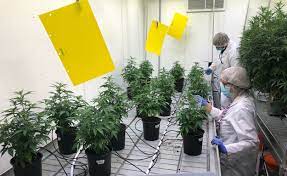BioWorksCannabis

BioWorksCannabis
What we know and what we don't of CBD
CBD, or cannabidiol, has been the subject of extensive research in recent years, but there is still much to learn about its effects, mechanisms of action, and potential therapeutic applications. Here's a breakdown of what we currently know about CBD and what remains to be elucidated:
What We Know:
Safety Profile: CBD is generally considered to be safe and well-tolerated, even in high doses. It is non-intoxicating and does not produce the psychoactive effects associated with THC.
Epilepsy Treatment: CBD has been FDA-approved for the treatment of certain forms of epilepsy, such as Dravet syndrome and Lennox-Gastaut syndrome, based on clinical evidence demonstrating its efficacy in reducing seizure frequency and severity.
Anxiety and Sleep: There is growing evidence to suggest that CBD may have anxiolytic (anxiety-reducing) and sedative effects, potentially offering relief for those with anxiety disorders and sleep disturbances.
Pain Relief: CBD has demonstrated analgesic properties in preclinical and clinical studies, suggesting its potential as a treatment for chronic pain conditions such as neuropathic pain and arthritis.
Anti-inflammatory Effects: CBD has been shown to have anti-inflammatory effects in various animal and cell culture studies, which may be beneficial for conditions characterized by inflammation, including arthritis and inflammatory bowel disease.
Neuroprotective Properties: Some research suggests that CBD may have neuroprotective effects, protecting neurons from damage and potentially offering therapeutic benefits for neurological disorders such as Parkinson's disease and multiple sclerosis.
Skin Health: Preliminary studies indicate that CBD may have anti-inflammatory and antioxidant properties, making it potentially useful for managing various skin conditions, including acne, eczema, and psoriasis.
What We Don't Know:
Optimal Dosage: There is currently no standardized dosage for CBD, and optimal dosing can vary depending on factors such as the individual's weight, metabolism, and the condition being treated. Further research is needed to determine the most effective dosages for different conditions.
Long-Term Effects: While short-term studies suggest that CBD is safe and well-tolerated, more research is needed to assess its long-term safety and potential side effects, especially with prolonged use.
Mechanisms of Action: Although CBD interacts with the body's endocannabinoid system, its precise mechanisms of action and how it produces its therapeutic effects are not fully understood.
Efficacy for Various Conditions: While there is promising evidence for the therapeutic potential of CBD in certain conditions, more research is needed to determine its efficacy across a broader range of medical conditions and symptoms.
Drug Interactions: CBD can interact with certain medications, particularly those metabolized by the cytochrome P450 enzyme system in the liver. Further research is needed to better understand these interactions and their implications for medication safety.
Regulatory Status: The regulatory landscape surrounding CBD varies by country and jurisdiction, and there is ongoing debate and uncertainty regarding its legal status, particularly in relation to its sale, marketing, and use as a dietary supplement.
In summary, while CBD shows promise as a therapeutic agent for various health conditions, further research is needed to fully understand its effects, optimal uses, and long-term implications. It's essential for consumers to consult with healthcare professionals and rely on evidence-based information when considering the use of CBD for medical purposes.
